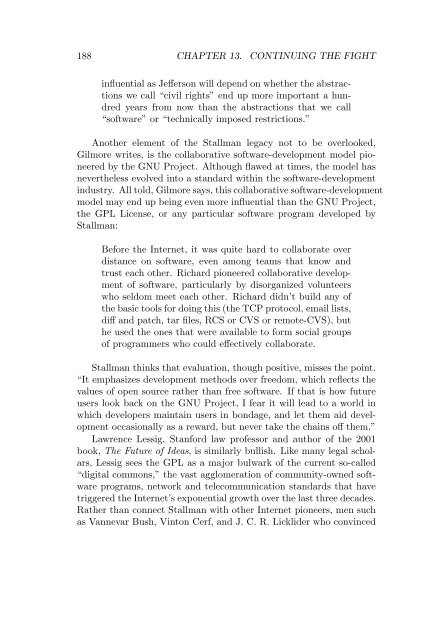Create successful ePaper yourself
Turn your PDF publications into a flip-book with our unique Google optimized e-Paper software.
188 CHAPTER 13. CONTINUING THE FIGHT<br />
influential as Jefferson will depend on whether the abstractions<br />
we call “civil rights” end up more important a hundred<br />
years from now than the abstractions that we call<br />
“software” or “technically imposed restrictions.”<br />
Another element of the Stallman legacy not to be overlooked,<br />
Gilmore writes, is the collaborative software-development model pioneered<br />
by the GNU Project. Although flawed at times, the model has<br />
nevertheless evolved into a standard within the software-development<br />
industry. All told, Gilmore says, this collaborative software-development<br />
model may end up being even more influential than the GNU Project,<br />
the GPL License, or any particular software program developed by<br />
Stallman:<br />
Before the Internet, it was quite hard to collaborate over<br />
distance on software, even among teams that know and<br />
trust each other. Richard pioneered collaborative development<br />
of software, particularly by disorganized volunteers<br />
who seldom meet each other. Richard didn’t build any of<br />
the basic tools for doing this (the TCP protocol, email lists,<br />
diff and patch, tar files, RCS or CVS or remote-CVS), but<br />
he used the ones that were available to form social groups<br />
of programmers who could effectively collaborate.<br />
Stallman thinks that evaluation, though positive, misses the point.<br />
“It emphasizes development methods over freedom, which reflects the<br />
values of open source rather than free software. If that is how future<br />
users look back on the GNU Project, I fear it will lead to a world in<br />
which developers maintain users in bondage, and let them aid development<br />
occasionally as a reward, but never take the chains off them.”<br />
Lawrence Lessig, Stanford law professor and author of the 2001<br />
book, The Future of Ideas, is similarly bullish. Like many legal scholars,<br />
Lessig sees the GPL as a major bulwark of the current so-called<br />
“digital commons,” the vast agglomeration of community-owned software<br />
programs, network and telecommunication standards that have<br />
triggered the Internet’s exponential growth over the last three decades.<br />
Rather than connect Stallman with other Internet pioneers, men such<br />
as Vannevar Bush, Vinton Cerf, and J. C. R. Licklider who convinced


